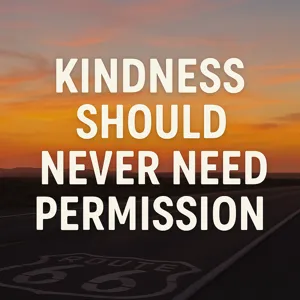
Kindness Should Never Need Permission
Kindness should never need permission. Not from a policy, not from a manager, not from a mood. If someone is hungry, you share. If someone is lost, you point. If someone is hurting, you stay. On Route 66 and in the stories we tell at Faith and Good Courage, I’ve watched small acts of mercy change the temperature of a room, a day and a life.
Faith and Good Courage is my diner-booth ministry in plain clothes. No pulpit, just people. The road keeps teaching the same lesson: the world gets loud; kindness still gets through. You do not need a sign-off to hold a door, speak gently, or leave a tip that tells someone they matter. You already have approval. Consider this your green light.
What this page is
This is the home base for a simple campaign with a simple truth. Use it to find stories, ideas, and language you can carry into your own day. Share it with a friend who needs a nudge toward courage. Return to it when the world feels stingy.
Why “Kindness Should Never Need Permission” matters
- It removes hesitation: you act because it is right, not because it is requested.
- It restores dignity: you meet people as equals, not projects.
- It builds courage: small, steady kindness forms a habit stronger than fear.
Five ways to live “Kindness Should Never Need Permission”
- Carry cash for “quiet tips” at diners and roadside cafes; say “thank you” like you mean it.
- Learn a first name and use it kindly. Seen people become steady people.
- Answer rudeness with kind words, not sarcasm. Mercy cools a hot day.
- Leave a short note of encouragement on a receipt or napkin. Keep it human, keep it simple.
- Offer help before you are asked. Do the obvious good that is in front of you.
Everyday courage, everyday kindness
The truth is, kindness rarely makes headlines, but it does make history in small, hidden ways. A simple gesture at a diner counter, a smile offered to someone who feels invisible, or a word of encouragement given at the right time can echo far longer than we imagine. Courage shows up when we act on kindness without waiting to be asked.
Stories from the road
If you want the longer versions, they live in the Journal and in our podcast stories. You will find coffee counters, desert air, and people who tried one kind thing and found out it was enough.
Read the Journal for first-person stories from the road, and visit The Route 66 Chaplain page to learn why this work matters to me personally. For a deeper look at why our culture feels short on empathy, explore The Compassion Deficit.
Join the movement
When you share your own moment of courage, tag it with #KindnessShouldNeverNeedPermission. Tell the story in your words. If social is not your thing, send me a note through the site. I read them. Your story will help someone else step forward.
FAQ: quick answers
Is “Kindness Should Never Need Permission” faith-based?
Yes, and it is also human. The teaching is simple: love your neighbor. No spotlight required.
Do hashtags work on my Journal posts?
No, not on a website as hashtags are not searchable. They work on social platforms. Use the hashtag when you share the link on Instagram, Facebook, TikTok, or X.
Can I use this phrase at work, school, or church?
Please do. Credit Faith and Good Courage when you can. Better yet, live it so clearly people ask where you learned it.
Helpful resources
Looking for ideas to practice kindness in your town? The Random Acts of Kindness Foundation offers practical prompts. Start small, start today.
Faith and Good Courage™ is a storytelling project rooted in real places and real people along America’s back roads. If this page helped you, share it with one person. That is how kindness travels. Remember, Kindness Should Never Need Permission.
